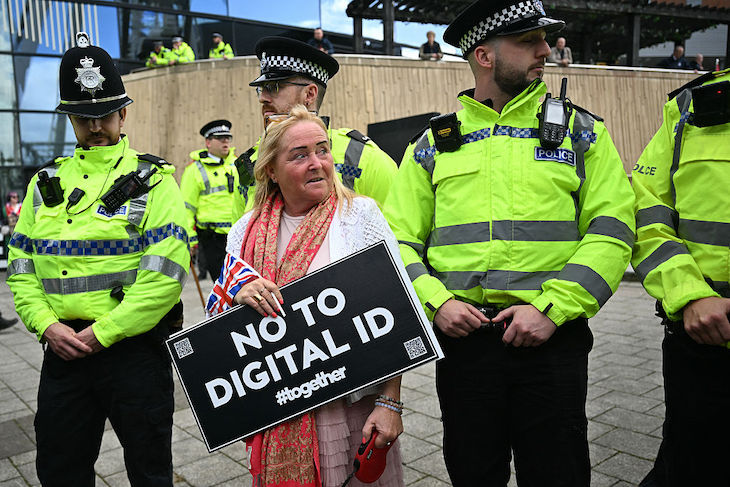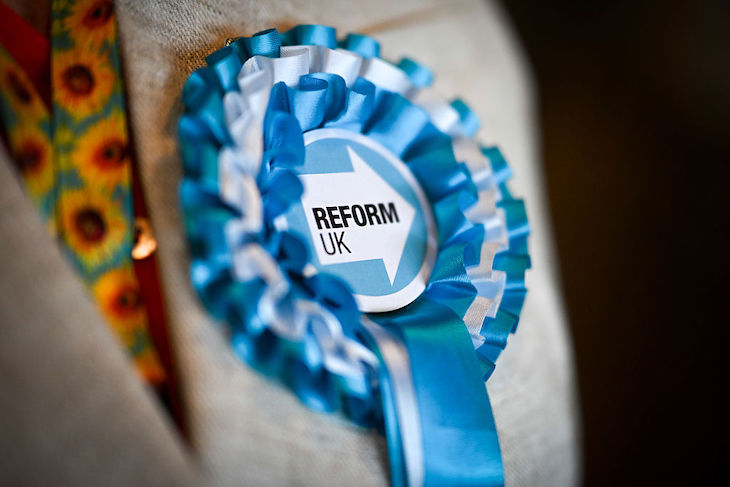Those who make the case in favour of national ID cards invariably do so on pragmatic grounds. As they have reminded us in recent days following Keir Starmer’s announcement of the rollout of digital ID, these would make life more simple, more convenient, secure easier access to public services, reduce fraud, criminal activity and even stem the tide of illegal immigration to this country.
Those who repeat the canard of ‘nothing to hide, nothing to fear’ should ask themselves the underlying belief they are really articulating
Who could possibly object to such reasonable-sounding arguments? National ID cards would be ‘for own good’ they continue, or more ominously: ‘if you’ve nothing to hide you’ve nothing to fear.’ Spectator readers will have heard a variation of that latter reasoning earlier this week, when Angela Epstein, reflecting on her uptake of a voluntary scheme in Greater Manchester in 2009, wrote: ‘If you’ve got nothing to hide, I told sceptics on repeat, you’ve got nothing to lose.’
I’m not sure those who utter these justifications, which sound so deceptively grounded in common sense, understand the grave and even sinister consequences of the principle that underpins them. And this should serve to remind us that when it comes to ID cards, we cannot rely on unfiltered common sense, concern for mere convenience and demand for short-term solutions. For such a weighty and consequential matter as this, we must instead ask: is it right or wrong in principle?
Principles matter. Because our society is shaped by them in the long run. Those who employ myopic arguments in favour of state intervention, with their ‘nothing to hide, nothing to fear’ rationale, imply that the precious division between the public and private sphere – that ultimate bulwark against authoritarianism – is not worth preserving. They unwittingly seek to foist on this country the principle of positive liberty.
This was the term coined by Isaiah Berlin in his inaugural lecture, ‘Two Concepts of Liberty’, at Oxford University in 1958. He defined ‘positive liberty’ as ‘the answer to the question: ‘What, or who, is the source of control or interference that can determine someone to do, or be, this rather than that?’. In short, and in its most coarse and coercive form, positive liberty entails the state deciding, decreeing and enforcing laws it believes conducive to the benefit of society as a whole. The principle found its most menacing expression with Jean-Jacques Rousseau’s assertion that the populace had to be ‘forced to be free’ for the common good.
Negative liberty, on the other hand, is founded on the idea that a person or persons ‘should be left to do or be what he is able to do or be, without interference by other persons.’ And negative liberty has been the unspoken guiding force in these islands for centuries, the assumption that everything is permitted except that which is forbidden. It’s a principle that stands in direct opposition to the belief that it’s the responsibility of the state to impose the conditions for freedom. Negative freedom has it that freedom should be regarded as a given and something to be safeguarded from government intrusion.
Although Berlin didn’t speak unequivocally in favour of either two ideas, he was forthcoming on the merits of the negative form: ‘The desire not to be impinged upon, to be left to oneself, has been a mark of high civilization both on the parts of individuals and communities’, he said, quoting that ‘most eloquent of all defenders of freedom and privacy, Benjamin Constant, who had not forgotten the Jacobin dictatorship, declared that at the very least the liberty of religion, opinion, expression, property, must be guaranteed against arbitrary invasion’. Berlin also cited such other luminaries as Jefferson, Burke, Paine and Mill, who all ‘made the argument for keeping authority at bay’ within reason and as far as possible.
In our current intellectual climate of presentism, few modern-day left-liberals or Starmerite technocrats would be likely to heed the wisdom of these dead white males. Many conservatives, suspicious of ‘theories’ that aren’t derived from common-sense or focused on immediate practical solutions, might also be wary of lofty, detached principles.
But tacit principles are essential because they ultimately determine what kind of society we live in. In France, a country that has never weaned itself off the philosophy espoused by Rousseau and enacted by the Jacobins, where the state still presumes to act as an agent that enforces and legislates freedom, it’s common for officials to stop people in the street or railway station and ask for their ID cards, turn up at work places to check for employees’ identities, and for employers to have their premises raided as a result of intelligence harvested by the machinery of the state.
Those who repeat the canard of ‘nothing to hide, nothing to fear’ should ask themselves the underlying belief they are really articulating. They should ask themselves if they really want to give more power to a British state and to police forces that are both overbearing and power-hungry enough as it is.







Comments